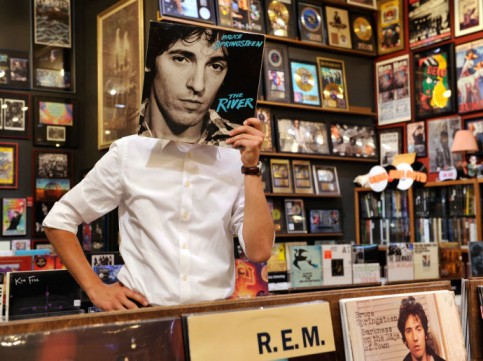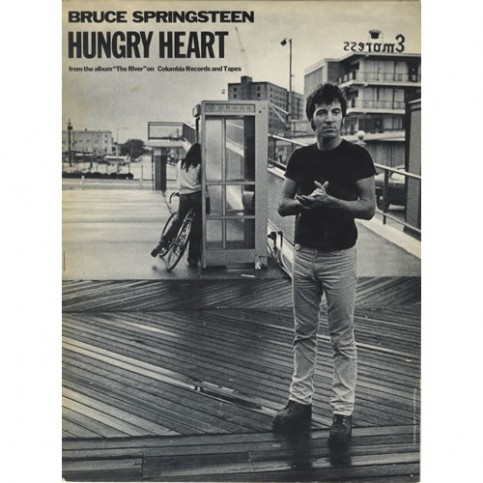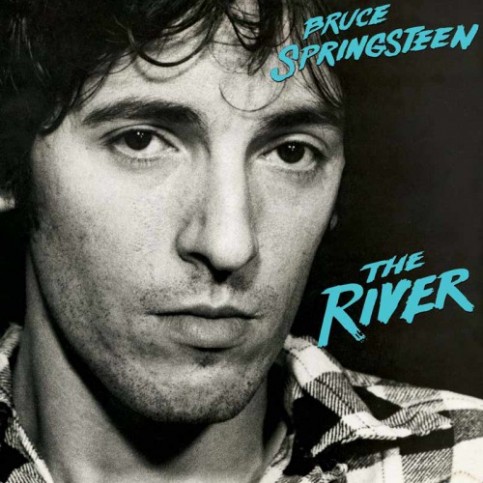The world is not lacking monuments to Bruce Springsteen. His work has been exhaustively parsed, reissued, celebrated, annotated, and admired. At present, it is wildly difficult to find a reasonable person willing to decry his oeuvre as insignificant or inadequate. In the nineteen-sixties, after Woody Guthrie got sick, Bob Dylan seemed primed to become the next working-class champion, the one shoved forward to represent the rest of us. But, in the end, something was off—he was too sneering, too cerebral. When Springsteen arrived, he was the chocolate Lab to Dylan’s housecat. He loved back.
“The River” was first released in 1980, and it was almost titled “The Ties that Bind” (a song of the same name came to open it). The twenty-track album, Springsteen’s fifth, concerns itself almost exclusively with interpersonal relationships and the passage of time. The photograph on the back cover of the LP features, tellingly, four paper bride dolls and one bewildered-looking groom.
Columbia will reissue “The River” as “The Ties that Bind: The River Collection,” a boxed set containing four CDs, three DVDs, and a glossy coffee-table book, on December 4th. (Merry Christmas, Dad!) Much like the entries in Dylan’s Bootleg Series, it proffers a more expansive portrait of a particular album, including, in this case, twenty-two rare and unheard outtakes from the studio sessions.

In recent years, Springsteen’s work has become more expressly political—it now directly addresses policy, not merely the workaday ramifications of policy—an agenda that continues to be tolerated if perhaps not embraced by his acolytes. Among conservative fans, Springsteen’s beliefs are often willfully misunderstood. This has been going on since at least since 1984, when Ronald Reagan praised “Born in the U.S.A.,” a seething anti-war anthem, for its optimism. New Jersey Governor Chris Christie’s fandom is so swooning and absolute it nearly inspires chagrin.
But “The River” isn’t a political record. Springsteen made it when he was newly thirty, not yet married but questioning the institution, bending it to the light, checking it for scratches, the way a person might inspect an old LP at a yard sale. It is as if he began to understand his life as finite and contained, and started asking the tough questions about what it means to be alone, and about the kind of person—if any—he might like by his side.
“The River” contains Springsteen’s first charting single, “Hungry Heart,” an exuberant pop song about a lost man (the piano riff at its center was inspired by the Four Seasons’ hit “Dawn (Go Away)”). At first, Springsteen tried to hand the song off. In the spring of 1979, the Ramones played a show at the Fast Lane, a boxy, salt-corroded night club near the boardwalk in Asbury Park. Springsteen appeared backstage afterward to express his admiration. “So I said to him, I said, um, you know, would you write us a song?” Joey Ramone later recalled.
But when Springsteen played “Hungry Heart” for Jon Landau, his erstwhile manager, Landau chastised him for always giving away his best jams (a year earlier, he had ceded “Because the Night” to Patti Smith; the Pointer Sisters’ take on “Fire,” a song Springsteen had intended for Elvis Presley, had recently made it to No. 2 on the pop charts). I’ve always been fond of Landau—a former and formative rock critic—for, in one of the earliest issues of Rolling Stone magazine, calling Eric Clapton a “master of the blues clichés of all the post-World War II blues guitarists,” a burn that supposedly facilitated the dissolution of Cream. “Keep this one close,” is what I like to think he whispered to Bruce after hearing “Hungry Heart.”

If “The River” has a prevailing ideology, it’s that life is lousy with binaries: highs and lows, victories and losses, sins and blessings. Musically and lyrically, “Hungry Heart” is the apotheosis of that idea: a goofy, honking pop song about a man splitting on his family, only to find himself even more broken and lonesome. Here, Springsteen posits that lonesomeness—dissatisfaction—is essentially inevitable. The vocals have been sped up, made boyish and round:
“We fell in love, I knew it had to end, we took what we had and we ripped it apart,” he chirps. His voice is unrecognizable. Later: “Don’t make a difference what nobody says, ain’t nobody like to be alone.”
Springsteen borrowed the song’s title and chorus from a line in Tennyson’s “Ulysses,” a poem about a broken wanderer, a road dog who just can’t quit, “cannot rest from travel,” even in his dotage, even as his family waits at home. Tennyson seemed to consider him heroic, but his Ulysses is, by any reasonable metric, a tragic dude. He skulks about—“How dull it is to pause”—trying to convince everyone around him that perpetual motion is an antidote to the hard work of being alive.
“Come, my friends, ’t is not too late to seek a newer world,” Ulysses preaches. His great purpose, he believes, is “To sail beyond the sunset, and the baths of all the western stars, until I die.”
Ulysses shares this objective with nearly all of Springsteen’s most beloved protagonists, men who roam, adventure, and journey—or die pining. Road-as-redemption, road-as-actualization: these are foundational American myths. They’ve been collectively internalized with a remarkable impunity; decades of American art position the road as liminal, freeing, a kind of emotional purgatory where little registers beyond one’s own forward plunging. It is a malignancy we have nevertheless nurtured and protected. “Nothing behind me, everything ahead of me, as is ever so on the road,” is how Kerouac puts it. Wake up one morning, and the whole odious tangle seems too hard, too sad? Run like you’ve caught fire. Drive it like it’s stolen.
Springsteen, for his part, isn’t sure if this instinct is cowardly or brave. I’m not sure, either. I suppose it’s both:
“Like a river that don’t know where it’s flowing, I took a wrong turn and I just kept going.”
There’s a lot of anxiety on “The River” about the permanence of love, a paranoia that reaches a kind of apex at the end of side two, with the odd sequencing of “I Wanna Marry You” and the album’s title track. Springsteen’s rumbustious, shirtsleeves-rolled-to-the-elbow narrators are fierce guardians of the women they care for—whether that protection is provoked or even desired is not addressed—and “I Wanna Marry You” sees one of them swallowing his unease regarding the durability of love, promising, instead, to do his best for his girl:
“They say in the end true love prevails, but in the end true love can’t be no fairy tale,” he sings. “To say I’ll make your dreams come true would be wrong, but maybe, darlin’, I could help them along.” It is a thoughtful, studied offer.
What happens next, though, is grim. “The River” starts with a high, blustery harmonica solo; it blows through the song’s opening bars like a tumbleweed. Written about his sister and brother-in-law, “The River” recounts a teen-age pregnancy, a joyless wedding, a broken economy, and a gray life. The vibe is airless resignation.
“Now I just act like I don’t remember,” he sings. “Mary acts like she don’t care.”
Because there is nothing else to do, they seek a baptism: into the river they dive.

“The River” recalls Hank Williams’s “Long Gone Lonesome Blues,” a song, from 1950, in which an unnamed river functions similarly—a siren, beckoning the brokenhearted but denying them absolution.
“But I got to the river so lonesome I wanted to die, oh Lord! And then I jumped in the river, but the doggone river was dry. She’s long gone, and now I’m lonesome blue,” Williams yodels.
At the end of the second chorus, Springsteen emits a noise—”Oh, down to the river we did ride, mmm-yi-yi!” He’ll do it again, that broken little mumble after the line, but it’s never as fraught or as desperate as that first time, in which he sounds as if he’s been struck, hard, behind the knees. There, contained in that slur: all the loss in the world.
Chronologically, “The River” occupies a curious spot in Springsteen’s discography, the dénouement to “Darkness on the Edge of Town” and a precursor to “Nebraska,” the bleak folk record Springsteen put out in 1982. “Nebraska” is defiant in its wounded depictions of American strife: “Everything dies, baby, that’s a fact,” Springsteen sings on “Atlantic City,” the album’s spectral, ominous second track. And he means everything: not just our corporeal selves, but our devotions, obsessions, sacred oaths. Somehow, that’s not even the song’s most shattering bit: “I got debts no honest man can pay,” Springsteen concedes in the second verse. It is as pure an admission of spiritual defeat as any other line in American verse.
“Nebraska” surprised fans and critics—Springsteen made it at home in Colts Neck, New Jersey, without the E-Street Band, using a four-track Portastudio tape recorder—but plenty of its themes, both musical and lyrical, were seeded on “The River,” which I still believe to be Springsteen’s most self-probing album. These songs—some crushing, some jubilant—explore how hard it is not to love but to be loved, to be held accountable to the devotion you’ve inspired in another person, to receive it without collapsing. The anxious narrators of “The River,” sometimes they get it right. Mostly they don’t. It doesn’t matter: the road goes on forever.

You must be logged in to post a comment Login